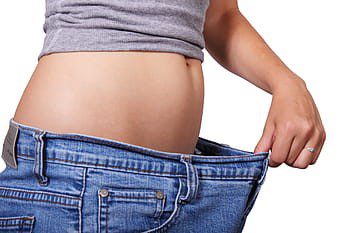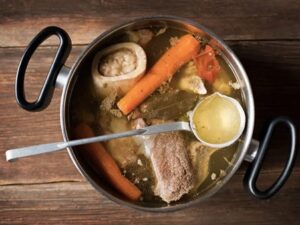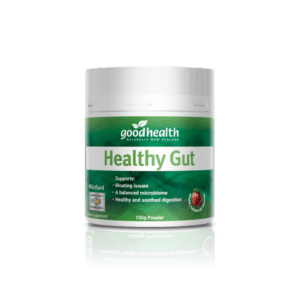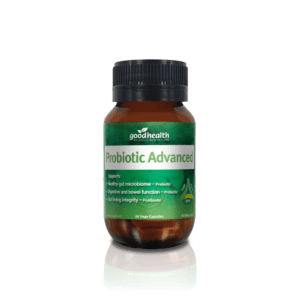
Hands up who likes the feeling of a bloated tummy! No one? Exactly. Bloating is often a sign of poor digestion and an unhealthy gut. In this guide, our naturopaths share expert tips on how to support gut health naturally, reset your digestive system, and beat bloating for good.

-
Chew your food thoroughly for digestive and gut health
Sometimes the oldest tricks in the book are there for a reason. The first step for better digestion is to chew your food properly. This is because teeth, through mastication, and the enzymes in your saliva, start the process of breaking down your food. Chewing your food properly means food will travel to the stomach and intestines in smaller particles, making it easier for your body to digest. Try to chew food to liquid before swallowing. Also, make sure you’re chewing with your mouth closed, and not only because it’s good manners; it helps to avoid swallowing air, which is an occasional cause of bloating and belching.
-
Eat the protein part of your meal first
Hydrochloric acid is produced by your stomach and is the strongest at the beginning of your meal. Eating the protein content of your meal last can cause food to not be digested properly, which can lead fermentation, gas, and bloating. Carbohydrate should be eaten last in a meal to support blood sugar balance.
-
 Try a low FODMAP diet for a short time
Try a low FODMAP diet for a short time
FODMAP stands for Fermentable Oligo-Di-Monosaccharides and Polyols. Carbohydrate foods that are high in FODMAP are among the worst foods for gut health and digestion, leading to bloating and discomfort for some people. The diet should only be used to support symptom lowering during a wider total gut health protocol. The following are some examples of FODMAP foods:
- Fructose (fruits, honey, high fructose corn syrup and some fruits such as apples)
- Lactose (from ultra-processed dairy)
- Fructans (wheat, onion, garlic, inulin)
- Galactans (beans, lentils, legumes)
- Polyols (sweeteners containing sorbitol, mannitol, xylitol, maltitol, and some stone fruits apricots, peaches, nectarines)
We advise you to chat to your GP or natural health practitioner regarding whether this temporary diet is right for you.
-
Don’t drink too much fluid with your meals
Excess fluid when you’re eating can dilute the digestive enzymes our body produces to break down food. This slows down the natural digestive process.
-
Why electrolytes matter for gut health and digestion
Eliminate processed foods and/or pre-packaged foods, which tend to be high in sodium but low in potassium. Sodium is an essential nutrient, and we absolutely need it every day. In fact, research has shown that the “sweet spot” for sodium intake to support overall health is 3-5 grams a day! At the same time, getting sufficient potassium was associated with the lowest risk of bloating independent of sodium intake. This means that it is probably an imbalance of sodium and potassium that is the issue. We need to get a balance of all the electrolyte minerals. So, eating “whole” salt in the form of unrefined sea salt or Himalayan salt, which have full, trace mineral profiles, instead of refined table salt, and whole foods instead of processed foods, is best. Whole food minerals also support regular bowel movements.
-
Avoid fizzy drinks
Carbonated beverages contain carbon dioxide to give them that fizz. These bubbles, however, end up in our digestive track where they can cause distension and gas.
-
Eat smaller meals until you feel better
Large meals distend the stomach, making digestion more difficult. Think of overstuffing a washing machine – nothing would get washed properly. While you recover, you could try to split your meals into 6, spread evenly throughout the day, and you may start to feel your digestive system kicking into a much better rhythm. Then, when you feel better, you might want to try going longer before eating again, as a healthy digestion should allow for the migrating motor complex (a sort of “sweeping out” of the small intestines) to be active between meals. Constant snacking can sometimes interfere with this and exacerbate bloating symptoms.
-
Stay hydrated
Water is one of the best gut health drinks, helping with digestion and reducing bloating naturally. Drink at least two litres of water a day. Make sure you’re drinking water between meals as this will support kidney function and detoxification and not DURING meals, as this will dilute your stomach acid and make bloating worse. Make sure all your minerals are balanced, which is essential for hydration. The significant electrolytes are magnesium, sodium, potassium, chloride, calcium, bicarbonate, and phosphate. You’ll need to ingest more electrolytes when you’re sweating. A homemade electrolyte drink for after exercise or sauna: half a level teaspoon of fine ground Celtic Sea salt and the juice of a small lemon stirred into a glass of filtered water.
-
 Keep moving and breathing
Keep moving and breathing
Exercise improves intestinal transit as well as helping to eliminate excess liquid. Even a short walk in your lunch hour can help keep bloating at bay. Walking or gentle movement after meals is a good thing to try. Squatting is very good for the bowels and can allow things to move through a little more effectively. Add to that, some deeper breathing after eating, which is not only good for the digestion, but is very calming as well.
-
Chill out
Eat your meals in a relaxed environment. Stress is another factor that affects your digestion and can lead to bloating, so try and relax so your body can carry out its natural processes properly. While it’s pretty easy to sit down with dinner in front of the telly, it’s always a better idea to eat in a more relaxed and less distracting space.
-
Give exotic tastes a try
Herbs and spices to support digestion include turmeric, ginger, fennel, and fenugreek – add these to your stir-fries or curries. Also, a hot cup of chamomile or peppermint tea is known to support recovery from bloating. You could also try chewing a few fennel seeds at the end of a meal to support digestion.
-

Best foods for gut health to support digestion naturally
Pineapple and celery may support recovery from bloating whilst dandelion leaf tea functions to support fluid balance. A grated carrot salad with coconut oil may help with microbial balance in the colon, potentially preventing nasties from getting into the blood stream. Many people with digestive issues respond well to a lower fibre diet, focusing on animal foods, which contain far more bioavailable nutrients than plant foods. Collagen broths, made from bones, connective tissue, meat, etc., can help with digestion. The gelatine in collagen broth increases enzymatic fluids in the digestive tract so that food may be broken down and moved through the stomach and intestines properly. Gelatine has also been shown to support healthy stomach acid levels, gut lining integrity, and the sparing of protein breakdown in the body. It aids in proper digestion and absorption and supports healthy bowel movements. See 10 Reasons You Need to be Drinking Bone Broth for more details.
The amino acid, glutamine, found primarily in animal foods and dairy, is essential to support gut lining integrity. Glutamine is the preferred fuel for the cells of the most absorbative section of the gut, the small intestine. Zinc is also essential to support a healthy digestive tract and, no surprise, the most bioavailable sources of zinc are animal foods.
-
Keep your microbiome balanced and support good bacteria in gut naturally
Microbes in our gut support digestion and make healthy substances that our body can use. An imbalance of harmful to healthy gut bacteria, also known as dysbiosis, can cause bloating and the release of toxins into the bloodstream. Probiotic-rich foods and fermented options like kimchi, kefir, and sauerkraut help increase good bacteria in the gut naturally, supporting a balanced and healthy microbiome…oh and stay calm! Even your microbes don’t like you to be stressed!
 Healthy Gut
Healthy Gut
For bloating and digestive support in a supplemental form, try Good Health Healthy Gut. Healthy Gut is a scientifically developed formula specifically designed to calm bloating, support intestinal cell repair and regular bowel movements, and soothe an irritated gut. Healthy Gut contains GutGard®, the postbiotic EpiCor®, glutamine, beta-carotene, zinc and aloe vera to support a healthy and bloat-free digestion and a balanced microbiome.
 Probiotic Advanced
Probiotic Advanced
Also try Good Health Probiotic Advanced, a scientifically researched, triple action, prebiotic, probiotic, and postbiotic gut health support supplement. The prebiotic supports growth of good gut bacteria in the microbiome. The probiotics are specific, potent strains for gut health that support healthy digestion and bowel function. The postbiotic is an advanced, inert microorganism that supports gut lining integrity and a healthy immune system. Probiotic Advanced supports a healthy microbiome and bowel function, calms bloating, and supports the immune system.
